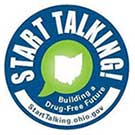|

 |
ODE Start Talking
10 tips to
Start Talking! with your kids about the dangers of drug abuse
6/2/2016
Research shows that children are up to 50 percent less likely to use
drugs when parents or other trusted adults, such as teachers, talk with
them about drug abuse.
Start Talking! is a drug prevention initiative designed to encourage
frequent conversations with children about substance abuse. Start
Talking! and the Drug Free Action Alliance offer 10 tips to begin a
productive conversation with kids.
Talk frequently - Make it a habit to talk with your child daily about
everyday stuff. Once you have made it a routine to talk about normal,
everyday activities, it is easier to steer conversations to more
intense discussions about drug use. Talking to your kids about drugs is
not a one-time conversation, it should be a regular part of your weekly
routine.
Show interest - Give your child your full attention when they’re
talking. Be interested and listen to what they are saying. Show that
you are willing to take them seriously and their comments and opinions
matter.
Be careful what you say - Avoid being judgmental or talking down to
them once your child expresses thoughts or feelings about drug use.
Even if you do not agree, be willing to hear your child’s viewpoint and
allow him or her to express it without criticism.
Be careful how you say it - Be aware of your tone of voice and body
language. Sometimes it isn’t what we say but how it’s said. Avoid
sounding shocked, angry or disgusted by comments your child may make.
Remember, these conversations are difficult for your child too, and
they may not have the conversational skills to express everything they
want to say in the most mature way.
Know the facts about drugs/alcohol/tobacco - The more you know about
substance abuse, the more confident you will be when conversing with
your child. The Parent 360 Rxprogram is a good way to learn updated
information on drugs and alcohol and what kids may be experiencing and
hearing away from home. Experts say informed parents are more
successful in their talks with kids.
Be respectful and genuine - Respect what your child has to say and be
fully engaged in the conversation. Be sincere in your reactions and
honestly interested in their viewpoint. Kids are more likely to talk
about drugs and alcohol on a regular basis, if they know their comments
will be listened to and valued.
They talk, you listen - Avoid interrupting your child as they talk.
Resist lecturing when it’s your turn to talk.
Scare tactics don’t work - Prevention experts advise that scare tactics
and over-dramatic statements will not get the attention of your child.
Consistent, calm and frequent conversations on the topic are a far
better way to go.
Control your emotions - If the talk gets heated and you show anger or
frustration, the child will likely stop the conversation. Set emotions
aside, listen carefully, offer facts, experience and expectations
without harsh judgment.
Take advantage of teachable moments - Teachable moments occur each day.
You may be listening to the radio or watching TV when an ad comes on,
or situation or news story which involves drugs or alcohol. Use this to
bring up the topic and get your child’s reaction. Another good time is
when you’re in the car. The child is a captive audience. No one is
forced to look face-to-face and your child may feel comfortable to talk
freely.
|
|
|
|

